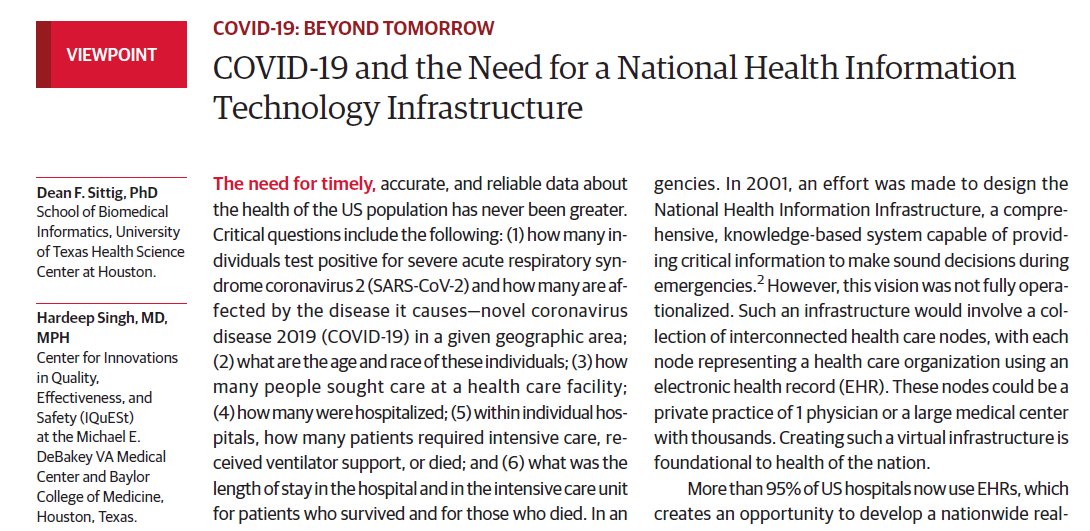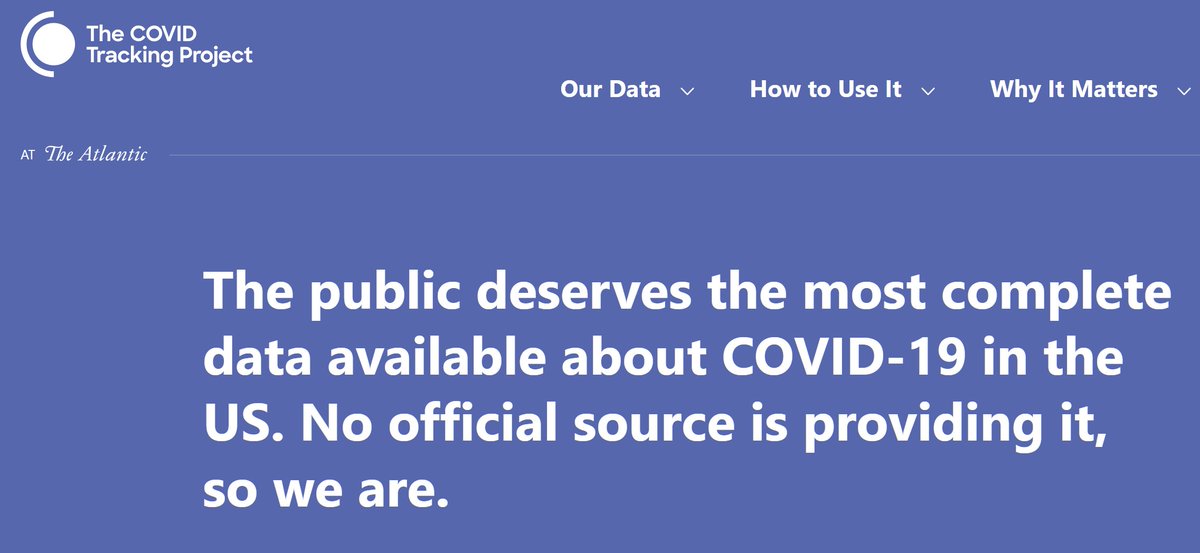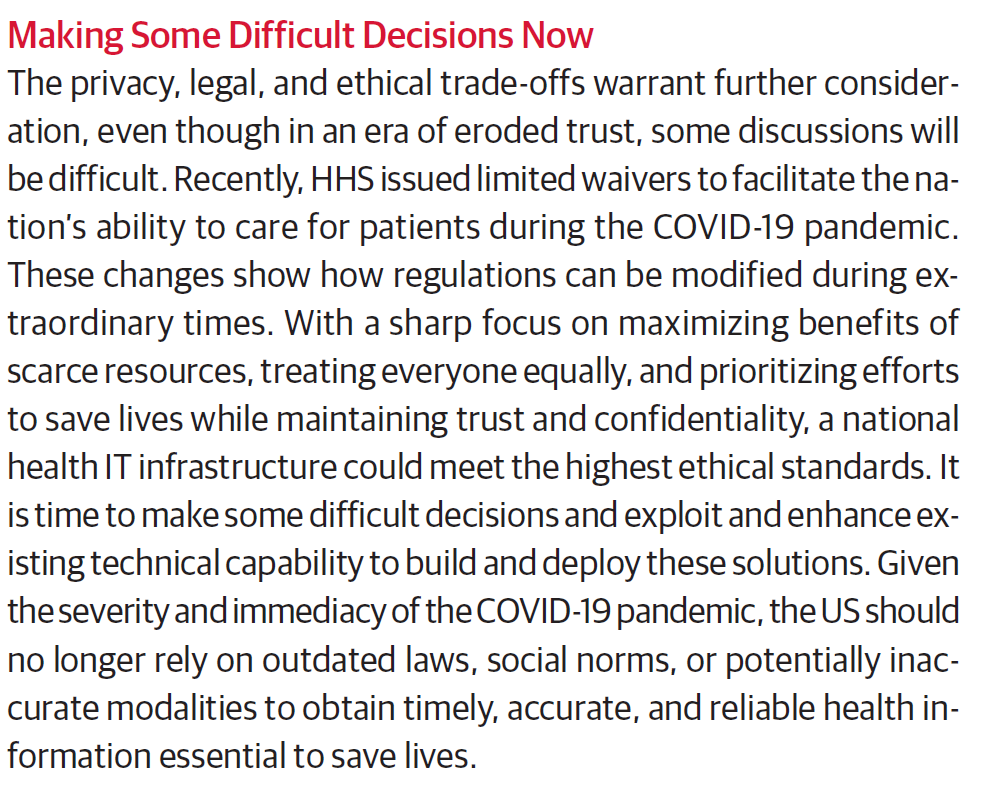US need not rely on hospitals emailing #COVID19 data or internet connected thermometers to get timely, accurate, and reliable data about the nation’s health
We need a new National Information Spine
Thread on our @JAMA_current paper w/ @deansittig 1/
https://jamanetwork.com/journals/jama/fullarticle/2766368">https://jamanetwork.com/journals/...
We need a new National Information Spine
Thread on our @JAMA_current paper w/ @deansittig 1/
https://jamanetwork.com/journals/jama/fullarticle/2766368">https://jamanetwork.com/journals/...
A national health IT spine would be a virtual backbone to provide critical up-to-date patient health information to make sound decisions in times like the COVID pandemic and other public health emergencies 2/
Real-time, technology-driven, surveillance & reporting spine can tell us: how many affected by COVID-19 in given geographic area; their age/race; how many sought care/were hospitalized; & how many required ICU, ventilator, or died. See Germany data 3/ https://twitter.com/HardeepSinghMD/status/1248997786777006090?s=20">https://twitter.com/HardeepSi...
US technologically advanced and spends most money on health care but the White House Task Force requested hospitals to email some of this basic information recently
4/ https://www.gnyha.org/news/federal-request-for-covid-19-data/">https://www.gnyha.org/news/fede...
4/ https://www.gnyha.org/news/federal-request-for-covid-19-data/">https://www.gnyha.org/news/fede...
In March, several proxies of the data were being used. In addition to Kinsa thermometer to trend “fever levels” we relied on influenza like illness. A national health IT spine could provide more accurate data 5/ https://twitter.com/JeremyKonyndyk/status/1240663797603459072?s=20">https://twitter.com/JeremyKon...
Plus many outstanding volunteer efforts help gather useful information that US should be collecting nationally shows why this national IT spine is needed. Best known is @COVID19Tracking 6/
State of gathering data at a national level should prompt questions about the basic notions, norms, and assumptions that have long governed health and health care of the US population. 7/
Key information needed by White House Task Force only possible through widespread data collection, aggregation, & analysis. This comes with a price in terms of tradeoffs to make significant changes to existing health IT and legal infrastructure to gather and analyze data. 8/
Most changes technically possible, but currently illegal or socially unacceptable. Will COVID-19 change current expectations for privacy, confidentiality, open markets, continuous monitoring of locations and activities, and strategic but focused government intervention? 9/
2001 vision to design the National Health Information Infrastructure, a comprehensive, knowledge-based system capable of providing critical information to make sound decisions in emergency situations failed but must be revisited. 10/ https://aspe.hhs.gov/report/information-health-strategy-building-national-health-information-infrastructure">https://aspe.hhs.gov/report/in...
A national health IT infrastructure would have tremendous benefits – atleast 5 we identified - incl. assisting national public health surveillance efforts advocated by Mark McClellan @ScottGottliebMD @Farzad_MD @cmyeaton @LaurenRSilvis 11/ https://twitter.com/deansittig/status/1262448389289054209?s=20">https://twitter.com/deansitti...
Regulations can be modified and exceptions made for data gathering during extraordinary times. But privacy, legal, and ethical trade-offs not easy and warrant further consideration to maintain adequate trust. Check out piece @MichelleM_Mello 12/ https://twitter.com/EricTopol/status/1259902403022741504?s=20">https://twitter.com/EricTopol...
As balance, most intrusive spine functions could be limited to public health emergencies. Governance overseen by a bipartisan public-private consortium that includes experts representing wide-ranging technical, legal, social, political, and ethical points of view 13/
By maximizing benefits of scarce resources, treating everyone equally, and prioritizing efforts to save lives while maintaining trust and confidentiality, such a national health IT infrastructure could meet the highest ethical standards. 14/

 Read on Twitter
Read on Twitter




